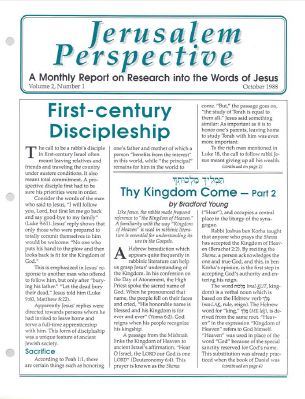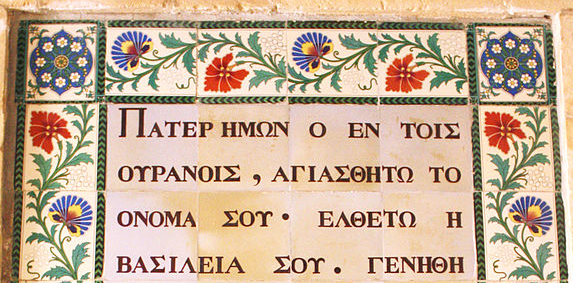This article belongs to the “Studying the Lord’s Prayer with Brad Young” series. For an overview of the entire series, click here.
A Hebrew benediction which appears quite frequently in rabbinic literature can help us grasp Jesus’ understanding of the Kingdom. In his confession on the Day of Atonement, the High Priest spoke the sacred name of God. When he pronounced that name, the people fell on their faces and cried, “His honorable name is blessed and his Kingdom is for ever and ever” (m. Yoma 6:2). God reigns when his people recognize his kingship.
A passage from the Mishnah links the Kingdom of Heaven to ancient Israel’s affirmation, “Hear O Israel, the LORD our God is one LORD” (Deut. 6:4). This prayer is known as the Shema (“Hear”), and occupies a central place in the liturgy of the synagogue.
Paid Content
Premium Members and Friends of JP must be logged in to access this content: Login
If you do not have a paid subscription, please consider registering as a Premium Member starting at $10/month (paid monthly) or only $5/month (paid annually): Register
One Time Purchase Rather Than Membership
Rather than purchasing a membership subscription, you may purchase access to this single page for $1.99 USD. To purchase access we strongly encourage users to first register for a free account with JP (Register), which will make the process of accessing your purchase much simpler. Once you have registered you may login and purchase access to this page at this link:

































































































Comments 2
Shalom, all,
I understand that JP’s stance is that the phrase “the poor in spirit” refers to those of the Kingdom of Heaven, Jesus’ movement on earth. But what I’m trying to understand is why Jesus chose that particular phrase (the poor in spirit) to refer to his people. Is this phrase found elsewhere in Hebrew literature? Why this phrase rather than any other, such as “my followers,” etc? When I research outside of JP, I hear a common thread, that the phrase refers to people who understand their spiritual bankruptcy before God which drives us to Jesus. One commentator says it like this: “To be poor in spirit is to recognize your utter spiritual bankruptcy before God. It is understanding that you have absolutely nothing of worth to offer God. Being poor in spirit is admitting that, because of your sin, you are completely destitute spiritually and can do nothing to deliver yourself from your dire situation. Jesus is saying that, no matter your status in life, you must recognize your spiritual poverty before you can come to God in faith to receive the salvation He offers.”
So, JP is helping me understand the what of the phrase, but I’m after the why of the phase. If any further enlightenment can be offered, I’d be very grateful.
Blessings to all,
Gary
Hi Gary,
Your instincts are right to distrust the “spiritual bankruptcy that drives you to Jesus” interpretation. It’s too convenient for modern Christians and doesn’t reflect a first-century Jewish milieu. You’re also right to look for a parallel to “poor in spirit” in ancient Jewish sources. An almost exact parallel occurs in the Dead Sea Scrolls where the Qumran covenanters refer to themselves as the “poor of spirit.” This self-designation probably refers to the fact that members of the sect gave all their personal possessions into the keeping of the community in order to receive the Holy Spirit, which they believed rested on the sect. Jesus’ demand of his disciples was similar, they were to divest themselves of their personal property in order to become full time disciples (a process Jesus called “entering the Kingdom of Heaven”). A key difference was that instead of giving their property over to the communal fund, Jesus expected his disciples to give their property away to the poor. We think it’s likely Jesus borrowed the vocabulary of the Essenes (“poor of spirit”) and combined it wit the vocabulary of the Pharisees (“Kingdom of Heaven”) to express his distinctive take on God’s redemption of Israel.
To learn more, check out David Flusser’s article “Blessed are the Poor in Spirit…” in his collection of essays Judaism and the Origins of Christianity (Jerusalem: Magnes, 1988).